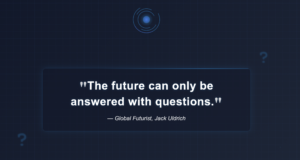
Thought Leadership: One definition of leadership is the following: “Leadership means making happen what otherwise would not.” This, however, begs the question: How do leaders “make happen what otherwise would not happen”? One answer is that effective leaders use new, different, and better questions to probe the future. To this end, I like this quote from Jensen Huang, the CEO of Nvidia, “I probably give fewer answers and I ask a lot more questions. It’s almost impossible now for me to go through a day and do nothing but ask questions. Through probing, I help my team explore ideas that they didn’t realize needed to be explored.” As a leader, are you doing the same?
Think Again: AI “deep fakes” are flooding the market. According to the article, a great number of “applicants” for remote working positions are no longer real people. In fact, by 2028, Gartner estimates 25 percent of all job applications will be fake people created by artificial intelligence.
Think Critically: Anthropic, in partnership with Northeastern University, recently unveiled “Claude for Education”. The new AI platform was not created to provide answers but was instead designed to guide students through a reasoning process to help them build their critical thinking skills. It is too soon to know whether the platform will work as promised (AI could, of course, weaken students critical thinking skills by making it too easy to find answers), but the news suggests AI will continue to move into the mainstream and will be a tool–for better or worse–for everyone to use in the future. On the business side of the equation, I also found this post on “Conversational Agents as Catalysts for Critical Thinking Skills” to be insightful. Among the key takeaways: AI, if used properly, can: 1) enhance the quality of decisions; 2) help junior members of a company or organization be better understood; and 3) reduce the pressure to conform. It achieves these desired outcomes primarily by serving as a “devil’s advocate” and asking difficult questions and raising uncomfortable observations.
Think Ambiguously: Your next therapist could be an AI bot. As the U.S. continues to struggle with a shortage of mental health providers, researchers from Dartmouth have been working to develop AI therapy bots to tackle this issue with positive results. While there are dangers in using unregulated AI therapy bots, advancements in the “Therabot” could help tackle the mental health crisis in America.
Think Smarter: The Stanford Institute for Human-Centered Artificial Intelligence (HAI) has released its 2025 AI Index Report. If you don’t have time to read the entire article, here are 5 critical insights to take away: 1) The democratization of AI power is accelerating; 2) The gap between AI adoption and value realization remains substantial; 3) Specific business functions show stronger financial returns from AI; 4) AI shows strong potential to equalize workforce performance; and 5) Responsible AI implementation remains an aspiration, not a reality.
Thoughts from Beyond: It is not often I attribute quotes such as the one above–”The future can only be answered with questions”–to myself, but this week I have chosen to do so because I am not only convinced that questions hold the key to our future, but I am growing increasingly confident that unanswerable questions are even more important. My reasoning is as follows: An “unanswerable question” requires us to stand free of all past knowledge, habits, assumptions and even beliefs, and it is in this space of “unknowing” that we may touch, taste and, perhaps, even grasp–albeit for only the briefest of moments–the greatest of unknowns. Whether you call this “great unknown” God, The Great Mystery, the Divine Spark, Enlightenment or any one of a countless number of other names, the way forward may not be through “knowing” but rather “unknowing.” (If you are curious about this idea, I encourage you to read William Johnston’s excellent translation of the ancient Christian mystical classic, “The Cloud of Unknowing.”
P.S. Here is another way to think of “unanswerable questions”–they are not about resolution, they are about transformation.
Afterthought: “It’s much more interesting to live not knowing than to have answers that might be wrong.”–Richard Feynman
